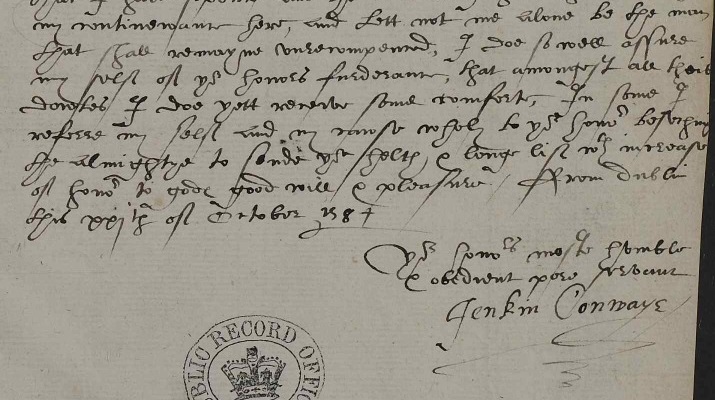
Capt. Jenkin Conway,
Goes to Ireland:
Jenkin was an officer who served in Ireland against the
Second Desmond Rebellion (1579-1583).
[Rowan, 23 May 1908]
says he came to Ireland in 1583
(the last year of the Rebellion).
See
Capt. Jenkin Conway in State Papers (1583 to 1596).
A letter of
8 Mar 1583
seems to show his arrival in Ireland,
working for Sir Francis Walsingham.
He is called "Walsingham's man".
A letter of
5 Apr 1583
says he has joined
Thomas Butler, 10th Earl of Ormond,
apparently in Co.Tipperary.
The rebellion ended with the killing of the Earl of Desmond
on
11 November 1583.
His vast estates were forfeit to the crown, and granted to loyal subjects.
Thus began the
Munster Plantation.
Granted Killorglin:
By 1584 there was talk of Jenkin Conway being granted the Earl of Desmond's property of
Killorglin,
Co.Kerry.
This was the originally 13th century
Killorglin Castle.
Jenkin writes on
21 Oct 1584 to
Sir Francis Walsingham about proposed grant to him of Killorglin.
He again writes on
10 July 1585
and says the
Lord Deputy Sir John Perrot
has granted him "custodiam" of Killorglin.
A letter of
10 Oct 1587 from him
survives, written from Killorglin Castle.
Grant to him of Killorglin is said to be
dated
1587.
A letter of
7 Jan 1589
(new style year)
from him to
Sir Edward Denny
survives.
In documents of
Feb-Mar 1590 (new style year)
he is named as a Captain, appointed to bring troops from Wales to serve in Ireland.
A survey of 31 Dec 1592
says Conway "hath of rentable lands the number of 526 acres, rent from Michaelmas 1591".
Grant of Killorglin was said to be confirmed in 1592.
He was also granted the island of Innisfallen
in Lough Leane near Killarney.
Nine Years' War, 1593 to 1603:
A company under his command served in the 1595-1596
campaign
against the rebel
Hugh Roe O'Donnell.
This was
part of the Nine Years War.
See letters
of 1 Aug 1595 and 12 Apr 1596 and 2 June 1596.
He is named as a Captain in documents up to 1596.
The rebellion came to Munster after the
Irish victory at Yellow Ford
in 1598.
Killorglin Castle was burned
in Aug 1600.
The war ended with English victory in 1603.
Death, 1607:
Capt. Jenkin
was apparently killed in 1607,
"by a shot through the body".
See letters from his son
to the Earl of Salisbury, apparently in 1608 to 1612.
These say that his father spent 24 years as a commander in Ireland.
We know for sure he died before 1612.
Capt. Jenkin and Mary had issue:


Original of the previous.
Mentioning Sir Edward Fitton. Signed by Jenkin Conway.

Is this our Jenkin and Mary?
There are other Jenkin Conways so maybe not.
At first it would seem to fit the dates of their children, baptised in London in 1576 and 1577.
However, Alice is meant to be the eldest daughter (born before 1576).
A bigger problem is what is "Chelester"?
Conclusion: Unclear if this is our couple.


Baptism of Jenkin Conway, St.Margaret's Church, Westminster, 26 Sept 1577.
From p.36
of [Burke, 1914].
Please donate to support this site.
I have spent a great deal of time and money on this research.
Research involves travel and many expenses.
Some research "things to do"
are not done for years, because I do not have the money to do them.
Please Donate Here
to support the ongoing research and
to keep this website free.